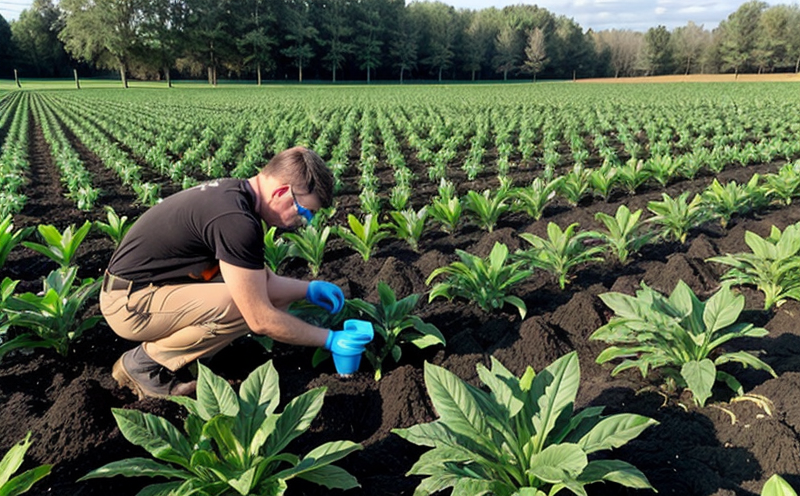Fertilizer Stability Testing under Storage Conditions
Testing fertilizer stability under storage conditions is crucial to ensure the integrity and effectiveness of fertilizers during transportation, storage, and application. This testing assesses how well a fertilizer retains its nutrient content and physical properties over time when exposed to various environmental factors such as temperature, humidity, and light.
The importance of this testing cannot be overstated for several reasons:
- Product Integrity: Ensures that the product delivered is the same quality as the one produced in the laboratory or factory.
- Regulatory Compliance: Many regions have strict regulations concerning the stability of fertilizers, especially those containing nitrogen, phosphorus, and potassium (NPK).
- Economic Impact: Ensures that farmers receive a product that is effective, reducing the need for additional applications or purchases.
Stability testing involves several key steps:
- Sample Preparation: Fertilizers are sampled under controlled conditions to ensure they represent the entire batch accurately. The samples are then divided into portions for different tests, including stability.
- Environmental Simulation: Samples are placed in controlled environmental chambers that simulate real-world storage conditions. These chambers can be set to various temperatures and humidity levels depending on the expected market region.
- Nutrient Monitoring: During the test period, nutrient content is monitored regularly using spectroscopic methods like Near-Infrared Spectroscopy (NIRS) or Atomic Absorption Spectrophotometry (AAS).
- Data Analysis: Results are compared against initial baseline data to determine any significant changes in nutrient content.
Understanding the stability of fertilizers under storage conditions is vital for several stakeholders:
- Quality Managers: To ensure consistency and quality throughout the supply chain.
- Compliance Officers: To meet regulatory requirements and avoid penalties or recalls.
- R&D Engineers: To innovate new formulations that can withstand harsher storage conditions.
- Procurement Teams: To select suppliers who deliver consistent product quality.
Why It Matters
The stability of fertilizers under storage conditions is a critical factor in ensuring the effectiveness and reliability of agricultural inputs. Fertilizer stability testing helps to:
- Ensure Uniformity: By assessing how well the product maintains its consistency over time.
- Promote Efficiency: Ensuring that farmers do not need to apply more fertilizer than necessary, which reduces costs and environmental impact.
- Avoid Waste: By preventing the degradation of nutrients before they can be used effectively in agricultural applications.
Storage conditions play a significant role in determining how long fertilizers remain effective. Factors such as temperature, humidity, and exposure to light can degrade certain components of fertilizers, especially those containing volatile compounds like nitrogen or phosphorus. This degradation can lead to:
- Nutrient Loss: Reduction in the availability of key nutrients for plant growth.
- Physical Changes: Alterations in the physical form, such as clumping or crystallization, which can affect application and distribution.
Scope and Methodology
| Parameter | Description |
|---|---|
| Temperature Range | From 10°C to 45°C, with variations depending on the region of intended use. |
| Humidity Levels | Relative humidity ranging from 30% to 90%, again adjusted according to regional climate conditions. |
| Light Exposure | Continuous light exposure or periodic exposure, depending on the type of fertilizer and its components. |
| Test Duration | Varies between 30 days to 12 months, depending on the expected shelf life of the product. |
The testing process typically involves:
- Sampling fertilizers from production batches under strict quality control measures.
- Storing samples in controlled environmental chambers that simulate real-world conditions.
- Monitoring nutrient content and physical properties at regular intervals throughout the test period.
- Data analysis to compare current data with initial baseline measurements.
Eurolab Advantages
Eurolab offers comprehensive fertilizer stability testing under storage conditions, leveraging state-of-the-art equipment and expertise in agricultural chemistry. Our advantages include:
- Accurate Testing: Utilizing advanced spectroscopic techniques for precise nutrient content monitoring.
- Comprehensive Reporting: Providing detailed reports that include all relevant test data, allowing stakeholders to make informed decisions.
- Regulatory Compliance: Ensuring that testing meets or exceeds all relevant international standards like ISO 17253 and ASTM D6400.
- Expertise: Our team of highly qualified chemists and engineers specialize in agricultural chemistry, providing tailored solutions for various fertilizer types.
We offer a range of services designed to meet the specific needs of our clients:
- Customized testing protocols based on client requirements.
- Comprehensive technical support during and after testing.
- Detailed analysis reports with actionable insights for product improvement.





